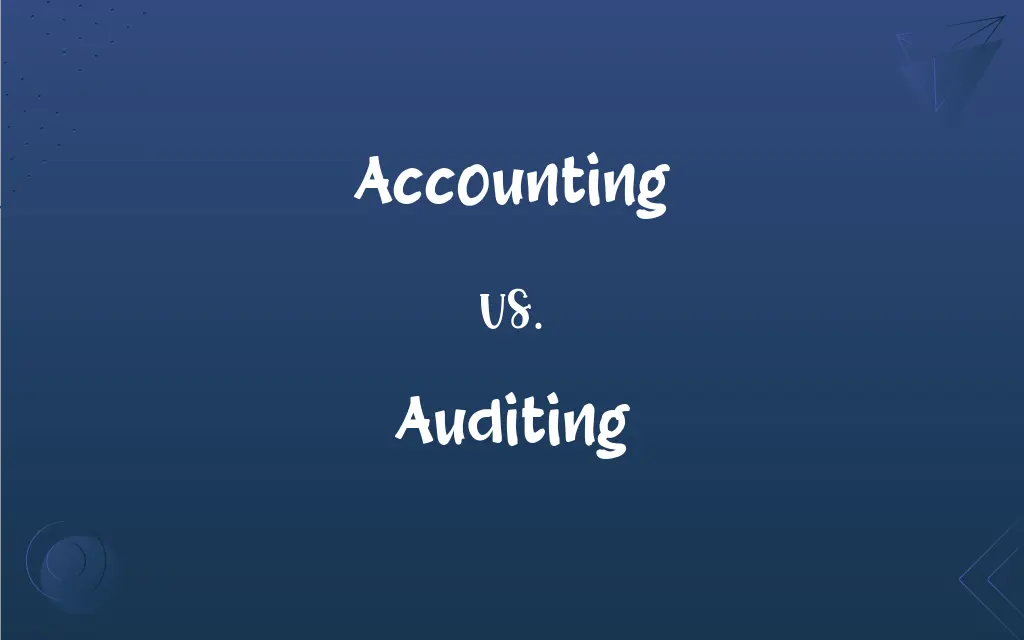Accounting vs. Auditing: What's the Difference?
Edited by Aimie Carlson || By Harlon Moss || Updated on October 21, 2023
Accounting involves recording, summarizing, and reporting financial transactions, while auditing evaluates the accuracy and reliability of those financial statements.

Key Differences
Accounting is the systematic process of identifying, measuring, and communicating financial information to help stakeholders make informed decisions. It involves the recording of financial transactions, classifying them, and summarizing them into financial statements. On the other hand, auditing is the examination of these financial statements to ensure their accuracy, completeness, and compliance with established standards and regulations.
Accounting encompasses a broad range of activities, from the daily recording of transactions (bookkeeping) to the preparation of annual financial reports. The primary aim of accounting is to provide a clear and accurate financial picture of an organization. Auditing, meanwhile, acts as a quality check. By evaluating the accounting records and the procedures used to produce financial statements, auditing offers assurance to stakeholders that the statements are reliable.
In the realm of accounting, professionals work diligently to ensure transactions are recorded timely and accurately, abiding by relevant accounting principles and standards. This foundational work sets the stage for financial planning, budgeting, and decision-making. In contrast, auditing comes after the accounting process. Auditors, whether internal or external, critically examine the end products of the accounting process to confirm their veracity.
While both accounting and auditing revolve around financial statements, their focus diverges. Accounting concentrates on creating the statements based on raw financial data, ensuring they reflect the organization's true financial position. Auditing, on the other hand, doesn't create but critiques. It assesses the statements, aiming to instill confidence among users by affirming their credibility.
Comparison Chart
Primary Function
Record and report financial transactions
Examine and verify financial statements
ADVERTISEMENT
Nature
Proactive, creating financial statements
Reactive, assessing financial statements
Purpose
Provide financial data for decision-making
Ensure reliability and compliance of financial data
Timing
Ongoing throughout the financial period
Typically performed after the accounting period
Professional Title
Accountant
Auditor
Accounting and Auditing Definitions
Accounting
Management of financial accounts and statements.
The company's growth is evident from its accounting records.
ADVERTISEMENT
Auditing
Assurance service to validate financial information.
Investors felt more confident after the positive auditing report.
Accounting
Classification and analysis of financial information.
Through accounting, the firm identified areas to cut costs.
Auditing
Evaluation of an organization's accounting processes.
The external auditing team assessed the company's financial protocols.
Accounting
Systematic reporting of financial data.
Proper accounting is essential for business transparency.
Auditing
Systematic review of financial operations and records.
The internal auditing department found inconsistencies in billing.
Accounting
Communication of financial health to stakeholders.
Good accounting practices kept the investors informed.
Auditing
Examination of financial statements for accuracy.
The annual auditing process confirmed the company's profit margins.
Accounting
The process of recording financial transactions.
The accounting department ensures all sales are logged.
Auditing
Verification of financial data's compliance with standards.
Auditing revealed discrepancies in the inventory records.
Accounting
The practice or profession of maintaining the financial records of a business, including bookkeeping as well as the preparation of statements concerning the assets, liabilities, and operating results.
Auditing
An examination of records or financial accounts to check their accuracy.
FAQs
Are auditors always external to the company?
No, there are both internal auditors (employees) and external auditors (outside firms).
What is the primary goal of accounting?
Accounting aims to record, summarize, and report financial transactions for decision-making.
How often should accounting tasks be done?
Accounting is ongoing, with daily transactions recorded, monthly reconciliations, and annual financial reporting.
When is an audit typically performed?
Audits are usually conducted after the close of a financial period, such as quarterly or annually.
What's an accounting cycle?
An accounting cycle includes steps from recording a transaction to finalizing financial statements for a specific period.
How do accounting and auditing relate to taxation?
Accounting records form the basis for tax filings, while auditing can check tax compliance.
Why might a company opt for a voluntary audit?
Companies might choose a voluntary audit to gain investor confidence, prepare for investment, or ensure internal financial health.
Who uses the results of an audit?
Investors, regulators, management, and other stakeholders use auditing results to gauge a company's financial health.
Can accounting be automated?
Many accounting tasks, like transaction recording, can be automated, but human oversight remains crucial.
Can an audit detect fraud?
While not its primary purpose, a thorough audit can identify irregularities, including potential fraud.
What's the difference between a financial audit and a compliance audit?
A financial audit examines financial statement accuracy, while a compliance audit checks adherence to regulations or policies.
Why is auditing important?
Auditing ensures the accuracy, reliability, and compliance of financial statements, instilling confidence among stakeholders.
Who can perform accounting tasks?
While anyone trained can perform basic accounting, certified professionals like CPAs handle complex tasks.
What's the difference between bookkeeping and accounting?
Bookkeeping involves recording daily transactions, while accounting is broader, encompassing summarizing, analyzing, and reporting financial data.
Do auditors have to follow specific standards?
Yes, auditors adhere to established auditing standards, ensuring consistency and reliability in their evaluations.
Do all companies need to be audited?
Not all companies are legally required to undergo an audit; it often depends on company size, type, or jurisdiction.
What do auditors look for in financial statements?
Auditors check for accuracy, completeness, consistency, and adherence to accounting standards.
How does accounting benefit a business?
Accounting provides insights into financial health, aids decision-making, ensures compliance, and informs stakeholders.
What are GAAP and IFRS in accounting?
GAAP (Generally Accepted Accounting Principles) and IFRS (International Financial Reporting Standards) are sets of accounting standards.
What skills are crucial for accounting?
Attention to detail, analytical thinking, knowledge of accounting principles, and communication are vital skills.
About Author
Written by
Harlon MossHarlon is a seasoned quality moderator and accomplished content writer for Difference Wiki. An alumnus of the prestigious University of California, he earned his degree in Computer Science. Leveraging his academic background, Harlon brings a meticulous and informed perspective to his work, ensuring content accuracy and excellence.
Edited by
Aimie CarlsonAimie Carlson, holding a master's degree in English literature, is a fervent English language enthusiast. She lends her writing talents to Difference Wiki, a prominent website that specializes in comparisons, offering readers insightful analyses that both captivate and inform.






























































